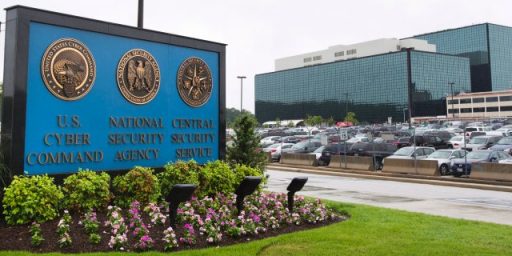Supreme Court Turns Aside Challenge To NSA Data Mining
An unusual challenge to the NSA's data mining program reaches its expected end in the Supreme Court.
The Supreme Court today rejected a challenge that had been filed by the Electronic Privacy Information Center against the National Security Agency’s data mining program, and while the decision not to take up the case wasn’t surprising in itself, the nature of the case was:
WASHINGTON — The Supreme Court on Monday turned away an unusual challenge to a National Security Agency surveillance program.
The Electronic Privacy Information Center filed the challenge directly with the Supreme Court, arguing that the Foreign Intelligence Surveillance Court had “exceeded its statutory jurisdiction when it ordered production of millions of domestic telephone records that cannot plausibly be relevant to an authorized investigation.”
The justices gave no reason for rejecting the group’s petition, but the unusual procedure of bypassing the lower courts probably played a role. Other, more conventional challenges to government surveillance programs are pending.
In urging the justices not to hear the case, the federal government said “the proper way” to challenge the surveillance “is to file an action in Federal District Court to enjoin the program, as other parties have done.” It cautioned, though, that “the government may assert certain threshold defenses to such a suit.” The case is In re Electronic Privacy Information Center, No. 13-58.
In February, in Clapper v. Amnesty International, the Supreme Court ruled, 5 to 4, that human rights groups, lawyers and journalists could not show they had been spied on, and so lacked standing to challenge a surveillance program.
After the recent revelations about widespread government surveillance, civil liberties groups have filed fresh challenges in federal trial courts, saying they can now show that they have standing.
I had written about this case when the suit was filed back in July and made note that the unusual procedural posture made it unlikely that the Court would grant a direct review in this particular case:
This is something of a unique issue, and indeed a unique strategy for approaching it by applying directly to the Supreme Court rather than starting down at the District Court level as other cases challenging the National Security Agency’s surveillance programs have done. Essentially, EPIC is arguing that because there is no way for them to appeal an order from a FISA Judge, their only option is to go to the Supreme Court and request what’s called a Writ of Mandamus. In layman’s language, they are essentially asking the Supreme Court to give specific direction to the FISA Court regarding the orders that it issues in these surveillance cases, specifically one that would prohibit that Court from issuing the kind of orders that allow the metadata collection. The odd thing about this argument, at least at the surface, is that these are programs that are authorized by the law so its hard to say how the FISA Court is exceeding its authority by authorizing actions by the NSA that are permitted by laws that have been been passed by Congress. Nonetheless, one has to give EPIC credit for taking such a bold legal step in going directly to the Supreme Court.
(…)
[The Supreme Court] could summarily dismiss the entire matter or rule that the Petition was not appropriately filed, meaning that EPIC would have to start back down at the District Court level. They could ignore the matter until their next conference and act on it then. Or, they could ask the government to file a response. That last action would be the best that EPIC could hope for out of the case at this point, because it would be first step in a process that might lead to a hearing on the merits of their Petition. It also, I think, happens to be the most unlikely outcome at this point, but we shall see.
As it turned out, the Court treated this matter about as I had expected. Direct appeals to the Supreme Court are highly unusual to begin with, and most often denied absent truly exigent circumstances. In this case, where EPIC had failed to proceed even at the District Court level, and thus establish the kind of factual record that ordinarily aids an appellate court in reaching its decision, it would have been even more unusual for the Court to grant the relief that was being sought here. Add in the further complicating fact that this involves a matter of intelligence gathering and national security, an area where Federal Courts have traditionally been reluctant to intervene, and the Court’s decision is not surprising at all.
None of this precludes EPIC from pursuing these claims in a the normal fashion. All they need to do is file the appropriate case in a Federal District Court and proceed in the normal fashion. There are, of course, no guarantees that they’ll succeed on the merits, but that’s true of any case that any court hears. What the Supreme Court said today, though, is that there are no short cuts in the Federal Court system.







It’s a nasty little rock and hard-place the Government has set up here, isn’t it? If you start in district court, the Government always claims state secrets and that the case has to be thrown out (and always, ALWAYS win on that argument). But if you try to bypass that dumb formality, they scream that the case belongs back down in District Court.
The only way you can definitively state that this program is authorized by law, is if you hold that the phone records of every single American is, legally speaking, “relevant” to a terrorism investigation, since that is the actual language used in the law authorizing the NSA’s data gathering. I find it interesting that you simply leap to that point and don’t seem to give it much deliberation. It’s one hell of a concession of the argument to the Government.
So this NSA brouhaha has been going on for sometime.
Anyone feel less inclined to use their phone? Seriously.
Anyone heard any Kafka-like stories…about black helicopters swooping in and spiriting John Doe of to a gulag somewhere in Siberia…based on NSA phone records?
Just wondering…
@C. Clavin:
As you know, this has been my point all along. People are freaking out over the “loss of privacy,” despite the fact that 1) the source of the information – private companies – obviously already has the data so the privacy is long-since lost, and 2) there’s a big yawning gap between “NSA knows I called my mom,” and “NSA drags me away to a concentration camp.”
It’s as if we suddenly noticed that police officers can look right at our faces. Yes, they can! They can look at us whenever we’re out of the house. Oh, the loss of privacy!
It’s a paranoia-dependent freak-out which as you suggest has probably had zero effect on the lives of 99.9999 percent of the American population.
It also rests on the imagination-challenged notion that the NSA’s spying will have a more deleterious effect on rights in this country than would another 9-11. This despite the obvious fact that the original 9-11 clearly challenged our civil liberties — at least to the extent that I am now forced to wear loafers when flying. Pile up three or four more 9-11’s and see what your civil liberties picture looks like.
@michael reynolds:
Between the ability of gays to marry who they wish, pot smokers to smoke if they wish, and the ability to purchase insurance and have a safety net by those who previously couldn’t, we as a society are much freer than we were just five years ago.
I fail to see the impact of the NSA…though that’s not to say something won’t happen. I feel pretty safe on the Metro-North headed into the City. Safety is freedom.
Police already abuse their power…that doesn’t mean we need to get rid of the police.
This is not exactly related, but close I think. I just got a demonstration today of the way our lives interact with data.
It started when I got a text: “Lufthansa wishes you Happy Birthday and offers you a special rate on travel to Norway.” That was weird, because my birthday is close, but I am not of Norwegian descent.
So then 5 five minutes later I get an email from my sister: “Happy upcoming Birthday from Norway. Is there anything we can get you at the Lufthansa duty free shop?”
So .. some entity parsed my sister’s email before it even got to me, packaged, sold it to Lufthansa, and generated a marketing text.
(By that point I was spooked and wondering why my sister put in “Lufthansa duty free shop” … did the robots edit it?)
Brave new world.
@michael reynolds: There’s a consistent subtext I see from many people who are up-in-arms about NSA “surveillance.” They want to make themselves feel important, and what better way to make oneself feel important than to worry about the mega-huge NSA listening in on your conversations?
It seems like they just can’t bear the thought of the government not giving a shit who they call. Sorry, kids, but the NSA really doesn’t care about you.
@C. Clavin: Anyone feel less inclined to use their phone? Seriously.
@john personna: I’m worried a hell of a lot less about the NSA than I am with what business manages to come up with via data-mining.
And given that the protection they have on their computer systems might as well be tissue paper, I’m far more liable to have problems with identity theft from privately-held systems than whatever silly file the NSA has accumulated on me.
(If you really want to poke a snoot at the Big Bad Agency, learn a few obscure languages or dialects and get your friends to learn them as well. Result: You speak Hungarian and the NSA will go nuts trying to interpret your mom giving you the recipe for goulash over the phone.)
@michael reynolds:
As one who is not overly freaked out by this NSA stuff (why would they care about me?) I do have to point out Michael, that the expansion of the NSA’s listening, into data mining, is a direct result of 9-11.
All those infringements on your civil liberties that you do worry about? It’s a package deal, and the NSA data mining is a part of the package.
@C. Clavin:
So I got down votes….but no answers.
Figures.
“there’s a big yawning gap between “NSA knows I called my mom,” and “NSA drags me away to a concentration camp.”
I guess no one here is Japanese American or knows where Manzanar is located, since that can never happen right Mr. Reynolds? That big yawning gap grows ever smaller everytime someone mouths such bland pronoucements that the fear of gov’t surveillance is “overblown”
My God, current fuzzy headed liberal thinking at its WORST.
Don’t worry, we have no privacy anyway so who gives a schitt if the gov’t can listen in since private companies can do that anyway?
And we ask why modern Dems are such pussified war supporting GOP lite corporatists nowadays whose only real difference is that they think abortions at the 8 month should be defended at all costs, that an illegal living in Calfornia for 3 years should pay less tuition than an out of state citizen and that gay marriage is the second or third most important issue in the world.
@michael reynolds: The Google Drive file that stores my the documents that I require to operate my class currently has over 500 documents on it–many of which are duplicates of other documents already posted (though that is hard to determine since everyone gives the documents new names to make them “easier” to find). Of that 500–new documents added almost daily–approximately 12 are germane to operating the class. Alas, those 12 are essential as most of them are required tests and quizzes. They sometimes become difficult to find–to say the least.
Multiply this by a factor of thousands, and you get the NSA data stream. I think you’re take on the whole issue is on point.
@the Q:
You don’t see a problem in bringing up Japanese-American internment as an example? Given that they were interned without benefit of computers at all, let alone NSA data-mining?
@the Q:
So a travesty that occurred 70 years ago should limit us now?
@Just ‘nutha’ ig’rant cracker:
You know, you could try calling the NSA directly. Surely they have a help line. “Guys, I’m looking for these 12 docs. . .”
@the Q:
Is the NSA focused on a specific group…like Japanese-Americans?
@michael reynolds: You’re glossing over a critical point of these lawsuits. It’s important to establish the limits of the NSA programs and any future programs that lawmakers dream up. These lawsuits will hopefully help to enforce legal checks on a system that doesn’t seem to have many.
I think being upset about the government obtaining data that you willingly pass through a neutral third party is, to say the least, pretty lame. At the same time, if the NSA is asserting that it can eavesdrop directly on any conversation, that actually would intrude on privacy. If the NSA is asserting it can take metadata, that’s a new arena and we should establish how deeply it can delve into interactions between private citizens without oversight.
It doesn’t help that the NSA is historically either silent on the data it has access to — which leads to us finding out from leaked documents that they’re hoovering up everything in the vicinity — or has directly lied about the data it has access to. One major issue that’s raised by the hoovering policy is that they probably don’t feel constrained by issues of privacy. Another is whether it’s compelling (or essentially compelling) third parties to provide data. (Remember when Qwest refused to hand over data? Allegedly, the NSA threatened future government contracts in that little “request.”)
Likewise, you’re right that most people won’t have to deal with the agency, but it’s clear that some people will. To that extent, this is a general justice system problem: most of us aren’t likely to be arrested, but it behooves us to look over the shoulders of the police and the justice system in general because our sense of justice demands that the process function correctly. The NSA currently has the ability to short-circuit some of that system, which makes it dangerous in a different way than your local goon squad cops.